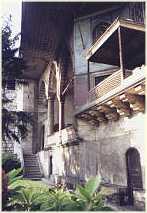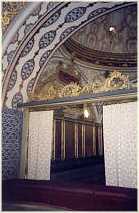When Sultan Ahmed I (1590-1617) came to the throne in 1603, he left his 11-year-old brother Mustafa in the "Cage", and he had a wall built to block the entrance. Mustafa was possibly already mentally retarded before he was incarcerated and the psychosocial depravation he experienced in the "Cage" can only have worsened his mental condition. He is described as a "paranoid", because he was overwhelmed by fear that he would be deposed or murdered - in itself no strange behaviour considering his circumstances.
Sultan Ahmed I used to take a different woman to his bed each night, although he subsequently favoured two women: Hadice and Kösem (1589-1651). Hadice was the mother of Osman II (1604-1622) and Kösem gave birth to Murad IV (1612-1640),
 Mustafa I was succeeded by Ahmed I's eldest
son, 13-year-old Osman II (to the right). Young Osman was very fond of archery -
especially with living targets, like prisoners-of-war or his own pages. Before setting out
on a military campaign in Poland, Osman ordered the execution of his brother Mehmed in
January 1621. Despite his youth, Osman soon managed to increase his power, replacing
Vezirs and banishing Mustafa's supporters. He forbade the consumption of wine and tobacco
and had drunken soldiers sent to the galleys as slaves. Also, he attempted to reform the
Janissaries, the Sultan's special elite corps. He tried to curb their power, because in
his opinion they had performed badly in the Polish campaign. In 1622 Osman announced his
intention to leave the city for a pilgrimage to Mecca. The Janissaries suspected he had
another destination in mind, because he seemed to prepare for taking his jewels and
treasures with him. Enraged they stormed the palace and captured Osman. They made him ride
on a cripple horse amidst the insults of the crowds before he was locked up in the prison
of the Seven Towers. When they tried to kill him, Osman fought with the strength of a
madman and killed six of his attackers before he was overpowered. Young Osman was put to
death by a combination of strangulation and compression of his testicles. His ear was cut
off and presented to his mother, Hadice, as an affront. Although fratricide was common in
the Ottoman Empire, this was the first act of regicide.
Mustafa I was succeeded by Ahmed I's eldest
son, 13-year-old Osman II (to the right). Young Osman was very fond of archery -
especially with living targets, like prisoners-of-war or his own pages. Before setting out
on a military campaign in Poland, Osman ordered the execution of his brother Mehmed in
January 1621. Despite his youth, Osman soon managed to increase his power, replacing
Vezirs and banishing Mustafa's supporters. He forbade the consumption of wine and tobacco
and had drunken soldiers sent to the galleys as slaves. Also, he attempted to reform the
Janissaries, the Sultan's special elite corps. He tried to curb their power, because in
his opinion they had performed badly in the Polish campaign. In 1622 Osman announced his
intention to leave the city for a pilgrimage to Mecca. The Janissaries suspected he had
another destination in mind, because he seemed to prepare for taking his jewels and
treasures with him. Enraged they stormed the palace and captured Osman. They made him ride
on a cripple horse amidst the insults of the crowds before he was locked up in the prison
of the Seven Towers. When they tried to kill him, Osman fought with the strength of a
madman and killed six of his attackers before he was overpowered. Young Osman was put to
death by a combination of strangulation and compression of his testicles. His ear was cut
off and presented to his mother, Hadice, as an affront. Although fratricide was common in
the Ottoman Empire, this was the first act of regicide. This time Mustafa refused to leave the "Cage" or even to open its door. So the Janissaries made a hole in the "Cage"'s roof. They saw Mustafa sitting with the two women and they claimed that he was "giggling like an imbecile". He was severely weakened, because no one had cared to serve him any food or drink for tree days. After bringing him water, they had the frightened Sultan hoisted up with curtain cords through the hole in the roof. Mustafa was placed back on the Ottoman throne, although he was still unable to rule effectively. He executed all those who had overthrown his nephew. But later mad Mustafa had forgotten that Osman was dead and ran in search of him through the palace, knocking on doors and crying out to his nephew to relieve him from the burden of sovereignty. Grand Vezirs followed one another in rapid succession and a donkey driver was appointed as muezzin for the Aya Sofya mosque. Throughout the realm governors refused to obey orders issued in the Sultan's name or send taxes to Istanbul. Soon the Janissaries, who could not be paid, began rebelling. In August 1623, the eunuch corps intervened, when Mustafa ordered the execution of his late brother Ahmed's other sons. The Grand Mufti stated that nobody who was mentally unbalanced could ever execute the duties of Sultan. Mustafa renounced his throne in favour of his nephew, Murad IV. This time Mustafa remained in the "Cage" until he died at the age of 47.

